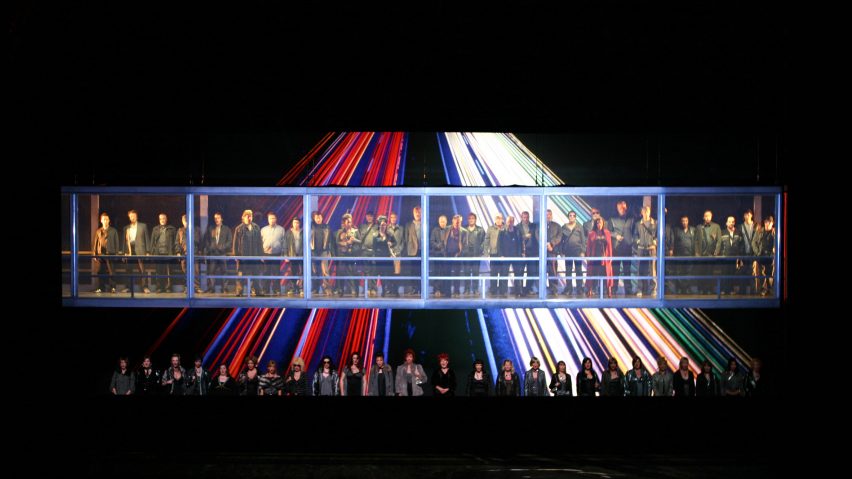Set designers Es Devlin and John McGuire have responded to singer Lorde's accusation that Kanye West stole the design of his latest live show, by stating that glass boxes are nothing new.
Lorde took to Instagram earlier this week to accuse Kanye West and Kid Cudi of stealing the idea of performing in a suspended glass box from her previous performances, which included a set designed by Devlin.
However, Devlin and McGuire – founder of Trask House, which designed the Kanye West and Kid Cudi set in question – have defended the artists by pointing out that suspended glass boxes are not a new idea.
Lorde "wasn't the first person to use a floating glass box"
Devlin told Dezeen that using suspended glass boxes is "not in any way new", and posted images of a suspended glass box she designed for the English National Opera in 2007 on Instagram.
McGuire made a statement to defend his studio's design. "[Lorde] wasn't the first person to use a floating glass box, she won't be the last," he told the New York Times.
"She doesn’t own it, her designer didn't invent it, he continued. "Cubes and floating aren't new to Kanye West, stage design or architecture. A quick google of floating glass box brings up many instances of suspended glass cubes."
Lorde's Instagram story showed images of glass boxes suspended above the stages on the New Zealand-born singer's Devlin-designed Coachella performance in 2017, and her Melodrama tour.
These were followed by an image of Kanye West and Kid Cudi in their own glass box, performing as Kids See Ghosts at the Camp Flog Gnaw festival in Los Angeles on Sunday night.
The final image in the story was of Lorde on stage in front of a tilted glass box, designed by Devlin, overlaid with the words: "I'm proud of the work I do and it's flattering when other artists feel inspired by it, to the extent that they choose to try it on themselves. But don't steal – not from women or anyone else – not in 2018 or ever."
"I see no imitation at work here"
Devlin confirmed to Dezeen that she worked on Lorde's Coachella stage set, but was not involved with Sunday night's show. "I worked with Lorde on her Coachella and Glastonbury performances. I did not work on the recent Kids See Ghosts performance," said the set designer.
"I admire both performances and I see no imitation at work here. The idea of a floating glass box of course is not in any way new and the geometry precedes all of us."
"I think the more interesting point is that both artists, responding to our disjointed times, are being drawn to this gesture of the fragile floating room, the world unmoored from gravity where the rules of civilisation and identity as we have known them may no longer apply," she continued.
Devlin designed elevated glass box for the English National Opera in 2007
Devlin initially responded publicly with a trio of Instagram posts in quick succession yesterday afternoon that seemed to refer to Lorde's post.
Each of Devlin's posts showed a different image of her elevated glass box stage set for the English National Opera's 2007 version of Carmen.
Devlin explained to Dezeen that the glass box fitted with the themes of that production.
"I was drawn to a similar form when designing Carmen for the English National Opera in 2007. In act three of Carmen, Jose decides to leave the rules and certainty of the army in search of liberation. The quest means unmooring oneself from the known and risking anarchy, chaos, loss of identity," she said.
Devlin and West have collaborated on many of the American rapper's stage shows since 2005, when Devlin designed a volcano for West to perform from at the BET Awards.
Pictures of the two together appear on the set designer's Instagram account, as well as many other of Devlin's designs that reference the cube.
These include the Magicbox, a two foot square cube installed at the V&A museum during London Design Festival in 2017, Beyonce's Formation tour set of the previous year and the stage set for a production of Chimerica at London's Almeida theatre.
During London Design Festival earlier this year, Devlin installed a fifth lion in London's Trafalgar Square that used machine learning technology to spout out a free-form poem on an LED screen in the lion's mouth.

